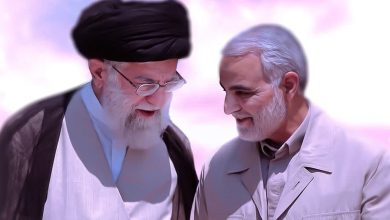Part One: From Birth to Martyrdom (Section One)

Family Roots and Upbringing of Qassem Soleimani in Kerman
Qassem Soleimani was born in March 1957 in the village of Qanat-Malek, located in Kerman Province, into a humble and religious family. His father was a hardworking farmer who earned an honest living through tireless effort. Soleimani’s early upbringing took shape in a rural environment infused with a culture of labor, popular piety, and traditional religious teachings. From childhood, he became familiar with the hardships of life, which instilled in him a resilient and diligent spirit.
During his teenage years, Soleimani moved to the city of Kerman and worked as a construction laborer. In this period, he gained a deeper understanding of social inequality, class divisions, and the difficult conditions of ordinary people. However, the turning point in his intellectual and spiritual journey came through his participation in revolutionary religious circles and pre-revolution gatherings. These experiences transformed the young Qassem into a committed revolutionary who played an active role in protests and grassroots organization during the years 1977–1979, leading up to the Islamic Revolution.
After the victory of the Revolution and the onset of domestic unrest, Soleimani joined the Islamic Revolutionary Guard Corps (IRGC). He quickly became known as a capable field commander admired by his troops and trusted by senior commanders. The Iran-Iraq War (1980–1988) marked a decisive period in his military and personal life. On the southern and western fronts — particularly in the Valfajr and Karbala operations — he commanded the 41st Tharallah Division and displayed extraordinary military intelligence, battlefield innovation, and a profound spirit of jihad. His close friendships with martyrs such as Ahmad Kazemi, Mohammad-Hossein Hemmat, Mehdi Bakeri, and Hossein Kharrazi formed a defining part of his wartime memories. He was not only a commander fighting on the frontlines but also a true comrade who shared the hardships of his soldiers.
After the war, Soleimani became a key figure in the evolving structure of the IRGC. His strategic transformation reached its peak when he was appointed Commander of the Quds Force in the late 1990s. In this position, he evolved from a local commander into the chief architect of the transnational Resistance Front. With deep insight into regional developments, he built strategic relations with Palestinian resistance groups, Hezbollah in Lebanon, Islamic Jihad, Ansarullah in Yemen, the Popular Mobilization Forces in Iraq, and the Zainabiyoun and Fatemiyoun brigades in Pakistan and Afghanistan — uniting them under one front against American and Zionist projects.
What distinguished Soleimani at this stage was not only his operational skill and battlefield leadership but also his profound political and ideological vision. His speeches and letters — to the Leader, to regional fighters, and even to his enemies — revealed a monotheistic worldview, a deep sense of loyalty to the Guardianship of the Islamic Jurist (Wilayah), and a strong commitment to the ideals of the Islamic Revolution. While waging war on the battlefield, he also charted the course of resistance with wisdom and moral clarity, making justice, dignity, and steadfastness the pillars of the movement.
Soleimani’s personal conduct was inseparable from his public identity. His modest lifestyle, love for martyrs, devotion to prayer and pilgrimage, and warm relationship with the families of martyrs and the poor reflected a man of deep humility, spirituality, and compassion. Though a powerful military commander, he remained profoundly human and approachable. He often said that he did not wish to be known as a famous general; his only desire was martyrdom — a wish that finally came true on January 3, 2020, at Baghdad International Airport in a U.S. terrorist airstrike carried out with Israeli support.



 Najah Mohammed Ali, journalist and researcher specializing in Iranian and regional affairs.
Najah Mohammed Ali, journalist and researcher specializing in Iranian and regional affairs.



